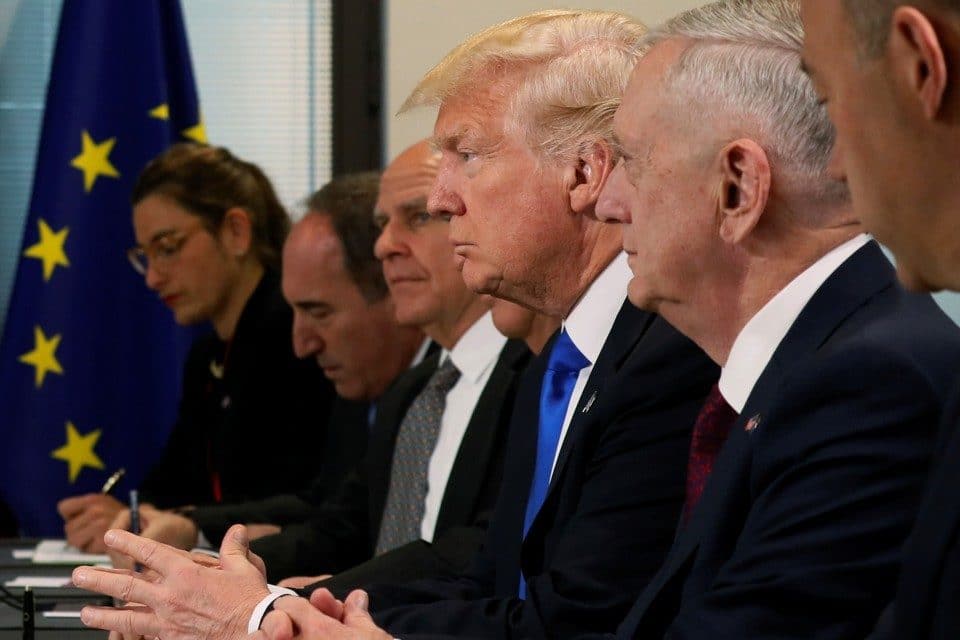But US rules out action in Syria and Iraq against Iranian-backed militias
LATEST
TUESDAY FEATURE
Podcast: A Trump Administration Showdown with Iran? (Not Yet.)
Top advisors to Donald Trump have proposed a more aggressive approach versus Iran in the Middle East, including in the Iraqi and Syrian conflicts.
“Six current and former US officials” have said a proposal — prepared by Defense Secretary Jim Mattis, Secretary of State Rex Tillerson, National Security Advisor H.R. McMaster, and other senior staff — was presented to Trump at a National Security Council meeting on Friday.
The proposal sets out measures to step up pressure on Iran which would not include a withdrawal from the 2015 nuclear agreement between Iran and the 5+1 Powers. While some activists in Washington have pushed for departure, the Administration has struggled to find a basis for the step: Trump has twice certified Iranian compliance with the terms of the deal, in line with the reports of the International Atomic Energy Agency. However, the US has adopted new sanctions, citing Iran’s ballistic missile testing and human rights record as well as alleged support of “terrorism” in the region.
Details of the proposals are vague. A “senior administration official” said, “I would call it a broad strategy for the range of Iranian malign activities: financial materials, support for terror, destabilization in the region, especially Syria and Iraq and Yemen.”
Iran has been an essential backer of the Assad regime since Syria’s uprising began in March 2011. In Iraq as well as Syria, it has supported and led militias — while those militias in Iraq have been effectively alongside the US in the battle against the Islamic State, many officials in Washington see the groups as a long-term threat to the government in Baghdad.
In Yemen, Iran has been fervently opposed to the Saudi-led military intervention in the country’s civil war. The US has accused Tehran of providing military assistance to the Ansar Allah (Houthi) insurgency which took over the capital Sana’a and other areas in early 2015. And in Bahrain, Iran is opposed to the Saudi-backed monarchy which has repressed protests, including the detention of many activists and killing of scores of demonstrators, since 2011.
The senior Trump Administration official also spoke of measures to counter Iranian cyber-espionage and potential nuclear proliferation. Sources said there would be more aggressive US interceptions of Iranian arms shipments to the Houthis in Yemen and to Palestinian groups in Gaza and Egypt’s Sinai Peninsula. Three officials said US naval forces could react more forcefully when confronted in the Persian Gulf by armed speedboats of the Islamic Revolutionary Guard Corps.
However, the proposals do not include an escalation of US operations in Syria and Iraq. Four sources said top advisors argued that standing up to Iranian-led militias in Syria and Iraq would distract from the priority of fighting the Islamic State.
Supreme Leader’s Top Aide Pushes Back IAEA Over Inspections of Military Sites
The Supreme Leader’s top aide, Ali Akbar Velayati, has pushed back the claim of the International Atomic Energy Agency that it can inspect Iranian military sites under the 2015 nuclear deal between Iran and the 5+1 Powers.
IAEA Secretary-General Yukiya Amano said on Monday that the IAEA is not distinguishing between civilian and military sites in determining whether an inspection is necessary.
Velayati responded on Tuesday, “Mr. Amano, his agents and no other foreigners have the right to inspect our military sites, because these sites are among off-limit sites for any foreigner and those affiliated with them.”
The Iranian official insisted that Amano’s claim about the IAEA’s right to inspection is “his own fabrication”. He argued that Amano is not independent, otherwise he would ask Israel to open its nuclear sites to inspection.
To date, the IAEA has not requested access to an Iranian military site, as there is no evidence indicating of a violation of the nuclear deal in those locations. The agency has repeatedly verified Iranian compliance with the deal.
But the US is pressing the IAEA to seek access, as part of the Trump Administration’s attempt to put more pressure on Iran.

